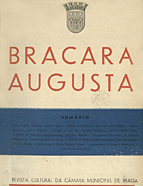

................................
One of the most prestigious Portuguese historical and scientific journals, in continuous publication since its foundation, is undoubtedly Bracara Augusta . This cultural journal of the Braga City Council, whose editorial origins date back to the first 11 issues of the Boletim do Arquivo Municipal de Braga (1935-1945), under the direction of José Constantino Ribeiro Coelho (1886-1967), corresponds to the “first series” of Bracara Augusta . Thus, when compiling a first volume with the aforementioned Bulletins, a new title was established, or a “second series” – Bracara Augusta. Cultural Journal of the Municipality of Braga – under the direction of Sérgio Augusto da Silva Pinto (1915-1970).
The first issue was published in August 1949, reaching around 60 volumes and bringing together an indispensable collection of documents, becoming a hallmark of Portuguese municipal journals. Bracara Augusta remains indelibly a project of a municipal nature and orientation, umbilically connected to the Braga City Council, without forgetting the contributions of the local Municipal Archive or, on another level, the Bracara Augusta Foundation, although our analytical field ends, for methodological reasons, in 2007.
Profoundly established in national academic circles, its primary purpose is to defend and disseminate history, far beyond a restricted academic environment and, despite its content and archival nature, its primary target audience is still, obviously, the residents of Braga, not least because it is named after the city’s ancient Roman name: Bracara Augusta. However, as might be expected, this geographical boundary of readers quickly expanded to international forums, and we dare say that it is rare to find anyone interested in history who has never consulted articles in this periodical. Just as history and historiography require appealing formats, Bracara Augusta continues to fulfil its original mission, presenting itself as a forum for debate where researchers of all ages and educational and academic levels can cooperate to promote historical culture, both in print and, enhanced by new information technologies, on digital platforms.
This work is financed by national funds through FCT - Foundation for Science and Technology, I.P, in the scope of the projects UIDB/04311/2020 and UIDP/04311/2020.
